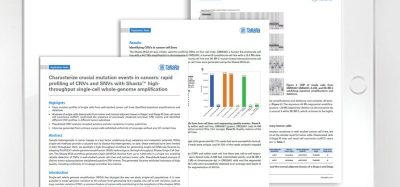New biomarkers found for cystic fibrosis
Posted: 31 July 2017 | Dr Zara Kassam (Drug Target Review) | No comments yet
Canadian researchers have identified several unknown chemicals that were consistently associated with babies who had cystic fibrosis (CF), including two different drug and environmental compounds the infants secreted in sweat at much lower concentration levels…


Canadian researchers McMaster University have identified several unknown chemicals beyond chloride that were consistently associated with babies who had cystic fibrosis (CF), including two different drug and environmental compounds the infants secreted in sweat at much lower concentration levels.
Scientists collected and analysed sweat samples from infants in CF clinics at the McMaster Children’s Hospital and the Hospital for Sick Children in Toronto. The findings, published in the journal ACS Central Science, shed new light on the underlying mechanisms of CF and could lead to improved prognosis and better therapies for a disease which is quite variable, affecting different children in different ways, say researchers at McMaster University.
“There are chemical signatures in sweat that tell us an infant has CF,” said Philip Britz-McKibbin, lead author of the study and a professor in the Department of Chemistry and Chemical Biology at McMaster University. “We set out to discover whether there were chemical indicators detected in sweat that could complement the gold standard for CF diagnosis: the sweat chloride test.”
The test is commonly used in universal new-born disease-screening programs and measures the concentrations of salt. Elevated sweat chloride confirms that an infant actually has CF. But there are some obstacles that complicate clinical decision-making, explains Prof Britz-McKibbin, because sweat chloride can result in ambiguous diagnoses in some borderline cases and does not reveal how the disease might progress for individual patients.
Biomarkers are redefining how precision therapies are discovered, validated and delivered.
This exclusive expert-led report reveals how leading teams are using biomarker science to drive faster insights, cleaner data and more targeted treatments – from discovery to diagnostics.
Inside the report:
- How leading organisations are reshaping strategy with biomarker-led approaches
- Better tools for real-time decision-making – turning complex data into faster insights
- Global standardisation and assay sensitivity – what it takes to scale across networks
Discover how biomarker science is addressing the biggest hurdles in drug discovery, translational research and precision medicine – access your free copy today
“Sweat contains lots of information related to human health that researchers have not fully analysed and we found some unexpected chemicals associated with CF,” said Prof Britz-McKibbin.
The biomarkers also point to other underlying mechanisms that contribute to the progression of CF and could lead to better therapeutic interventions earlier in life.”The easier it is to detect CF, the earlier it can be diagnosed, and the better people’s chances are at living a longer, healthier life”, says Joanna Valsamis, Chief Healthcare, Research and Advocacy Officer at Cystic Fibrosis Canada.
Related topics
Biomarkers
Related conditions
Cystic fibrosis
Related organisations
Hospital for Sick Children in Toronto, McMaster Children's Hospital, McMaster University
Related people
Joanna Valsamis, Professor Philip Britz-McKibbin








